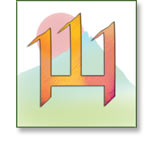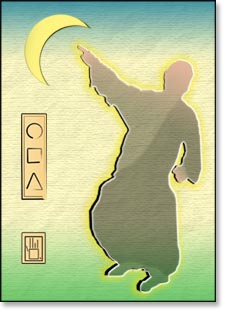On The Way: The Daily Zen Journal
Direct Pointing
Yuanwu (1063-1135)
When Bodhidharma came from the West bringing the Zen transmission to China, he didn’t set up written or spoken formulations – he only pointed directly to the human mind.
If we speak of direct pointing, this just refers to what is inherent in everyone: the whole essence appears responsively from within the shell of ignorance. This is no different in ordinary people than in all the sages since time immemorial. It is what we call the natural, real, inherent nature; fundamentally pure, luminous and sublime. It swallows up and spits out all of space. It is a single solid realm that stands out alone, free of the senses and their objects.
Just detach from thoughts and cut off sentiments and transcend the ordinary conventions. Use your own inherent power and take up its great capacity and great wisdom right where you are. It is like letting go when you are hanging from a mile-high cliff, releasing your body and not relying on anything anymore.
Totally shed the obstructions of views and understanding, so that you are like a person who has died the great death. Your breath is cut off, and you arrive at great cessation and great rest on the fundamental ground. Your sense faculties have no inkling of this, and your consciousness and perceptions and sentiments and thoughts do not reach this far.
After that, in the cold ashes of the dead fire, it is clear everywhere, and among the stumps of the dead trees everything is illuminated. Then you merge with solitary transcendence and reach unapproachable heights. You don’t have to seek mind or seek buddha anymore: you bump into them wherever you go, and they do not come from outside.
The hundreds and thousands of aspects and facets of enlightenment since time immemorial are just this. This is mind: there is no need to go on seeking mind. This is buddha: why keep struggling to seek buddha?
If you make slogans based on words and sprout interpretations based on objects, then you fall into the bag of antique curios, and you will never be able to find this true realm of absolute awareness beyond sentiments.
At this stage you are free to go forward in the wild fields without choosing, picking up whatever comes to hand: the meaning of the ancestral teachers is clear in all that grows there. What’s more, the thickets of green bamboo and the masses of yellow flowers and the fences and walls and tiles and pebbles are inanimate things teaching the Dharma. The water birds and the groves of trees expound the truths of suffering, emptiness, and selflessness. Based on one true reality, they extend objectless compassion, and from the great jewel light of nirvana they reveal uncontrived, surpassingly wondrous powers.
Changqing said, “When you meet a companion on the Path, stand shoulder to shoulder and go on: then your lifetime task of learning will be completed.”
Yuanwu (1063-1135)
Excerpted from Zen Letters – Teachings of Yuanwu; translated by J.C. Cleary and Thomas Cleary
These letters were written by the Zen teacher known as Yuanwu to various friends, disciples, and associates – to women as well as to men, to people with families and worldly careers as well as to monks and nuns, to advanced adepts as well as to beginning seekers.
Yuanwu is best known as the author of the single most famous Zen book, The Blue Cliff Record, a collection of meditation cases with prose and verse comments. Here in the letters, Yuanwu delivers the Zen message in a more accessible form, in direct person-to-person lessons.




Here in Yuanwu's work we find within the profound enlightenments of Zen, there are also glimmers of the direct teachings of “the inanimate things teaching the Dharma.”
While Zen can seem almost abstruse intellectually at times, there are the delightful images of the poetry in which the depth of nature is allowed to shine through. The impact on one who has dropped the division of the skin line to feel the profundity of connection with life around us is akin to becoming one with the Tao. This path beckons deeply for some and becomes a life long devotion.
For those of us who wish to return to our natural perception, we lean toward the unverbally spoken world. We may sit for many years with our own koan of how to learn and listen from nature. We may wait patiently for years before true listening is born, but with pure intent this Way can still be known.
It was almost dark on an early summer eve, and the forest was never more enchanting than now, at dusk. At dusk the mountain begins to withdraw its force back into itself and become quiescent. If you too can become quiescent, so still that you can't think of your name, you can feel this as a palpable fact. Just become so still that your mind won't be bothered to remember the mundane, and then you'll feel it like you feel the shifting of the winds. Then you'll know when the mountain changes from exhaling to inhaling. That's not so important in itself, but the mind that is quiet enough to notice is. The mind that is not always caught up in detail is your only treasure. Stop chasing details and become still to feel it. The mind that sees details clearly but is not caught by them is like a vast borderless mirror. That mind does not oppose itself.
The half-light of the forest seemed to reveal the essence while it obscured the parts. Sometimes that's easier, for when the pieces become too important, the essence becomes hazy and seems to withdraw. When the pieces become obscured by the half-light of evening, or better yet, by the light of detachment, the essence becomes clear and shining again. The splinters melt back into the whole. The branches grow back into the tree. Plunge in and swallow what before was merely nibbled, piece by piece. Let both life and death arrive and depart suddenly. It's not a matter of acquiring but rather of losing. Losing your hold on all that you've acquired. Just making room so the profound can enter and stretch its legs.
excerpted from Journeys On Mind Mountain
Looking at the moon,
Elana, Scribe for Daily Zen